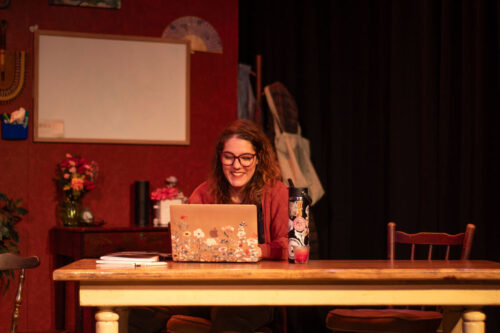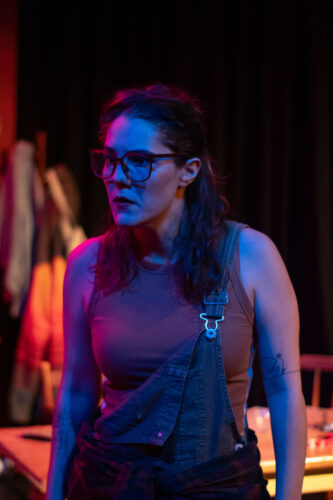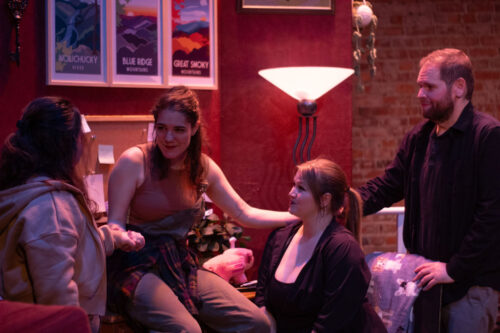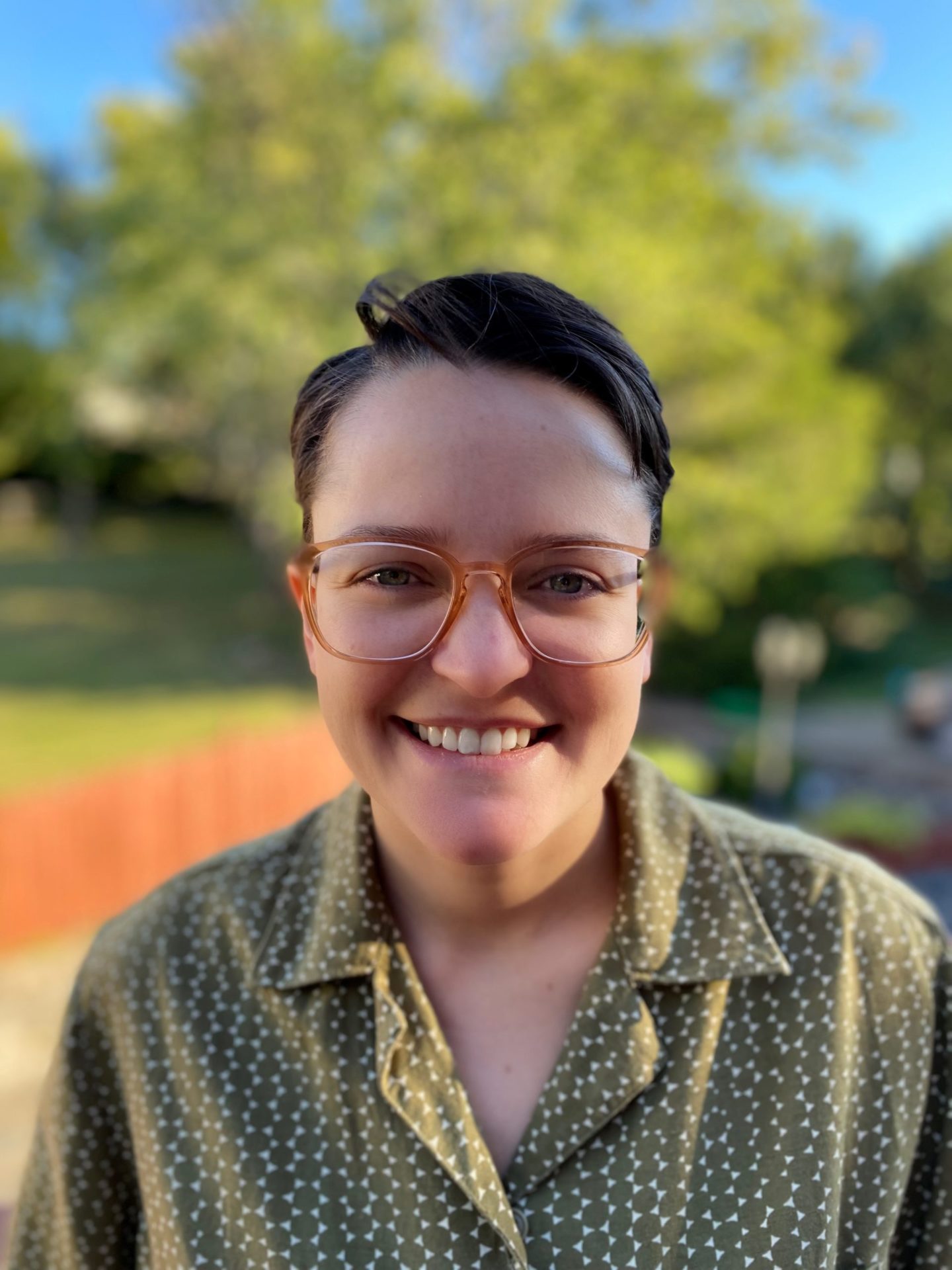At the Darkhorse Theater
A Tiny Beautiful Play
I hadn’t heard of the book Tiny Beautiful Things or its TV and stage adaptations before Women in Theatre Nashville announced this show. I had, however, heard of Cheryl Strayed’s other book Wild, which was adapted into a 2012 film starring Reese Witherspoon. While Wild is a straightforward memoir of Strayed’s backpacking journey of the Pacific Crest Trail, Tiny Beautiful Things is different, being a compilation of essays that she wrote over two years while serving as the Dear Sugar advice columnist for The Rumpus (the column is archived here). The people writing to this online literary magazine write well, and write full proper letters; imagine Dear Abby except with talented writers and no word count restrictions. Advice columns are uniquely enjoyable with their mixture of practical edification, entertainment, and schadenfreude, scratching some of the same itch as gossip or reality TV except with a claim to personal improvement.

A show comprised of letters requesting and receiving advice might sound like a dreary series of moralizing monologues, but the pacing of the 90 minute show is excellent, managing changes of topics without extended slogs of tragedy or wild oscillations from heavy to light topics. It never dragged or caused me to glance at my watch. The play was adeptly adapted for the stage by Nia Vardalos, who starred as Sugar in the 2016 premier performance. You probably know her as the writer and star of My Big Fat Greek Wedding. The letters she chose for the play were either unabridged or only lightly edited from the originals, maintaining the authenticity of the questions and answers.
I attended Tiny Beautiful Things on March 28th at their regular venue, The Darkhorse Theater. There was one set: Sugar’s house. National park posters were on the walls and scattered toys were evidence of her two children. A rectangular kitchen table with chairs stood stage left. Jules Robinson’s design was well-balanced and made the space feel lived in. The props that characters later used were organically included with other objects of decor.
As the play begins Sugar enters the house, tidies up toys left in the middle of the room, and then settles at the table with her computer. After briefly trying to work, she leans back and scrolls on her phone through TikToks. Kate Johnson’s series of audiobytes for this got laughs from the audience. Sugar is interrupted by an email from a friend, asking her if she’d like to take over his unpaid anonymous online advice column. While at first typing out a refusal, she decides to accept the role of Dear Sugar. The three other members of the cast come on stage and call out for advice in quick succession until one of them takes the center of the stage and gives a monologue: the first full letter asking for advice. Sugar listens, then answers. The show has some very funny moments discussing infidelity, santa kinks, and hapless dating advice, but much of the show focuses on intimately vulnerable human struggles. In her producer’s note, Stephanie Dillard writes: “Its premise is simple: people write letters seeking guidance, and Sugar responds. Yet in performance, these seemingly ordinary exchanges swell into something extraordinary, a surge of compassion and emotional resonance that far exceeds the play’s modest scale.”

This show requires a lot of the lead actress. Sugar is a unique person whose letters show her to be empathetic instead of pitying, having experienced great pain and made it to the other side. She isn’t afraid to call people out but never casts them out. She is funny but not a comedian. Strikingly for an advice columnist, she uses many personal stories as illustrations of the point she is making in her advice. This is tricky because anyone who has sat through many sermons or lectures can tell when personal anecdotes are genuinely helpful to the point being made, and when they’re merely self-absorbed. Sugar is never self-indulgent or glib. She uses the power of stories to illuminate her advice so we see her truisms as the hard, real truths they are. Kyla Ledes did this with grace. She had many monologues throughout the play, and her delivery always fit the moment perfectly, whether she was discussing her childhood sexual abuse, dating advice, motherhood, kleptomania, or grief. Many people, when portraying grief, make it clear that they haven’t yet experienced it in their own lives: it is not sadness, depression, or loneliness. While it may include all or some of those things, grief is a primary emotion, like joy or anger. Ledes’ performance was genuine. I emphasize this because some of the letters delve deeply into difficult topics, and any sense of inauthenticity would have spoiled the show.

The three supporting actors were fun to watch and seemed to have a blast: how many other shows allow them to go through so many characters and ranges of emotion in quick succession? JJ Lee’s comedy background certainly showed in her acting, and Fiona Barrett and Robert Coles did best in their tragic roles.
I attended the show with my mother. Some of the topics included in the show have touched our own lives. Discussing the show naturally led to a discussion of our own lives, and a wonderful conversation we might not have otherwise had. Unlike many other plays, a discussion of it afterwards basically requires fascinating and vulnerable conversation.
WIT is a young nonprofit organization, founded in 2023. Prior to Tiny Beautiful Things they’ve done two plays (links to our interview here and review here). What impresses me most about WIT is their excellent taste: they choose shows that are more than just entertainment and are within the abilities of a new, small organization. They haven’t announced their next season yet, but judging by their track record, it’s going to be good.
While the brief run of Tiny Beautiful Things is over, you can learn more about WIT here.



